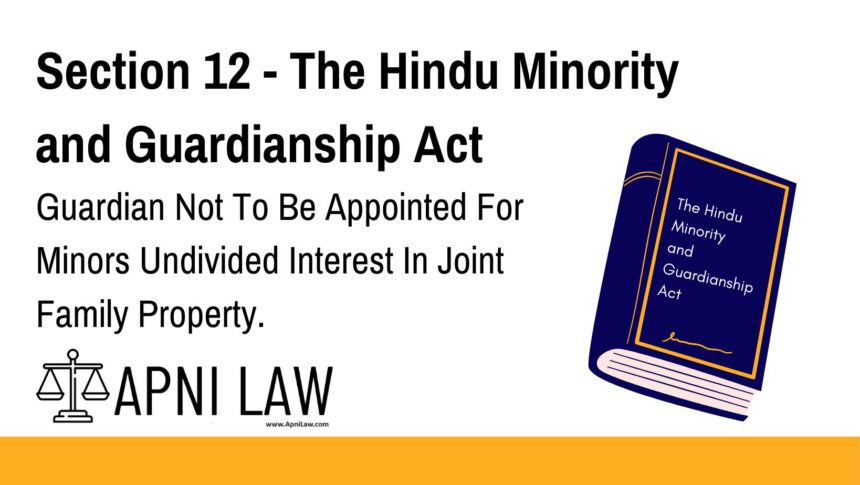Code
“Where a minor has an undivided interest in joint family property and the property is under the management of an adult member of the family, no guardian shall be appointed for the minor in respect of such undivided interest:
Provided that nothing in this section shall be deemed to affect the jurisdiction of a High Court to appoint a guardian in respect of such interest.”
— Section 12, The Hindu Minority and Guardianship Act, 1956
Explanation
Section 12 addresses the guardianship rights concerning a Hindu minor’s undivided interest in joint family property. It reinforces the traditional structure of Hindu joint families, where adult members manage the property on behalf of minors without the need for formal guardianship.
Key Highlights:
-
No guardian is needed for a minor’s undivided interest if the property is already being managed by an adult family member.
-
The intent is to preserve the joint family system and avoid unnecessary judicial interference.
-
However, this does not restrict the High Court’s power under its inherent jurisdiction to appoint a guardian if needed.
This provision prevents disruption of familial management and simplifies property oversight within the joint family context.
Illustration
🔹 Example:
Aryan, a 10-year-old Hindu boy, has an undivided share in the ancestral joint family property. His elder brother, age 30, is managing the entire estate.
📌 According to Section 12, no legal guardian needs to be appointed specifically for Aryan’s share, since the property is under the care of a competent adult family member.
🔹 High Court Exception:
However, if there are allegations of mismanagement or conflict of interest, the High Court retains the authority to intervene and appoint a guardian for Aryan’s share.
Common Questions & Answers
Q1: What is an “undivided interest” in joint family property?
It refers to a co-parcener’s share in the property which is not specifically divided or demarcated. Each family member has a collective ownership interest.
Q2: Who manages a minor’s interest in such property?
An adult member of the joint Hindu family, such as the father, elder brother, or uncle, usually manages the entire property, including the minor’s share.
Q3: Can a guardian be appointed despite Section 12?
Yes, the High Court can exercise its special jurisdiction to appoint a guardian if it deems fit for the welfare of the minor.
Q4: What if the adult managing the property is negligent?
In such cases, legal recourse can be taken. The High Court may appoint a guardian or direct property partition if it’s in the minor’s best interest.
Conclusion
Section 12 of the Hindu Minority and Guardianship Act, 1956, upholds the autonomy and tradition of Hindu joint family management by eliminating the need for a guardian over a minor’s undivided interest when a responsible adult is in charge. However, it maintains a vital safeguard—granting the High Court power to step in when necessary. This balance protects both tradition and the legal rights of Hindu minors.
For more detailed guides, legal provisions, and expert insights, explore 🔗 ApniLaw.








